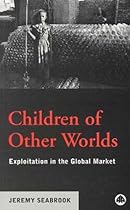Children of Other Worlds: Exploitation in the Global Market

| Author | : | |
| Rating | : | 4.93 (723 Votes) |
| Asin | : | 0745313914 |
| Format Type | : | paperback |
| Number of Pages | : | 192 Pages |
| Publish Date | : | 2017-01-19 |
| Language | : | English |
DESCRIPTION:
He is the author of The Refuge and the Fortress: Britain and the Flight from Tyranny 1933 - 2008 (2008), Consuming Cultures: Globalization and Local Lives (2006), Travels in the Skin Trade (Pluto, 2001) and Cities (Pluto, 2007).. Jeremy Seabrook is a researcher and writer
Cure the Source This ethnography served to not only shed light on the horror that is child labor, but it also served as a reality check. Child labor is terrible but the alternatives are worse. The revelation afforded by this ethnography is that laws against child labor do not solve the problem. Children will only find a new way to secure money. The new alternatives are worse and include begging, stealing, and/or prostitution. In fact, child labo. thoughtful and disturbing Lisa S. Parham this book is thoughtful and disturbing; it has research that may seem dry at times, but when you consider the human cost behind the numbers, it is horrifying. the author opens discussions about child labor and abuse within the context of social mores that are fascinating; then leaves the reader to decide for herself. well worth the read although i found myself unable even more convinced that child labor is a crime against humanit
From Publishers Weekly London-based journalist Seabrook (Travels in the Skin Trade), who has written widely on labor, Asia and the sex trade, compares child labor in contemporary Bangladesh with that of industrial Britain in the 19th century. The author poses many questions: Are we imposing normative or subjective values? Does a child really need an education? Can the South increase its wealth without slavery and colonialism? But he fails to answer any of them himself; instead, he relies on broad generalizations ("the disregard in Bangladesh for the individuality of children is a mirror image of our own excessive concern with individualism. By including extensive testimonials from Bangladeshi children, he illustrates many disturbing similarities in the mills and factories of the two nations in the exodus to the city, social attitudes to poverty, and the absolute necessity of child labor to supplement inadequate family income. It seems that human societies are destined
Examines why the sanction regime failed, and explores the real motivations of the powers involved.
